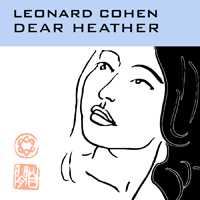Dear Heather
| Dear Heather | ||||
|---|---|---|---|---|
 | ||||
| Studio album by Leonard Cohen | ||||
| Released | October 26, 2004 | |||
| Recorded | July 9, 1985, 2002–04 | |||
| Genre | Rock, folk rock | |||
| Length | 49:27 | |||
| Label | Columbia | |||
| Producer | Leanne Ungar, Sharon Robinson, Anjani Thomas, Henry Lewy, Leonard Cohen | |||
| Leonard Cohen chronology | ||||
| ||||
| Professional ratings | |
|---|---|
| Review scores | |
| Source | Rating |
| Allmusic | |
| Robert Christgau | B[2] |
| Rolling Stone | |
| Pitchfork Media | (8.0/10)[4] |
| Piero Scaruffi | (5/10)[5] |
Dear Heather is the eleventh studio album by Canadian singer-songwriter Leonard Cohen, released by Columbia Records in 2004.
It shows a further departure from Ten New Songs, with more female lead singing and a marked increase in read poetry over sung lyrics, two of these being poems by other writers.
The album was set to appear under the title Old Ideas, but Cohen changed the title as he was assured it would mislead people to believe that it was a compilation or a "The Best of" album. The scrapped name is now the name of Cohen's twelfth album that was released in 2012. Again, Cohen recorded it digitally in his and Sharon Robinson's home studios in Los Angeles, as he did with his previous album, Ten New Songs..[citation needed]
The album reached #131 on the Billboard 200 and Internet Album charts and #5 on the Canadian Album charts. It was Cohen's highest charting album in America since 1969's Songs from a Room. The album's highest chart position came in Poland where it reached #1 on the Polish Albums Chart[6]
Track listing
All songs were written by Leonard Cohen, except where noted.
- "Go No More A-Roving" (words by Lord Byron, poem "So, we'll go no more a roving") – 3:40
- "Because Of" – 3:00
- "The Letters" (Cohen, Sharon Robinson) – 4:44
- "Undertow" – 4:20
- "Morning Glory" – 3:28
- "On That Day" (Cohen, Anjani Thomas) – 2:04
- "Villanelle for Our Time" (words by F. R. Scott) – 5:55
- "There for You" (Cohen, Robinson) – 4:36
- "Dear Heather" – 3:41
- "Nightingale" (Cohen, Thomas) – 2:27
- "To a Teacher" – 2:32
- "The Faith" (music based on a Quebec folk song, see "Un Canadien errant") – 4:17
- "Tennessee Waltz" (Redd Stewart, Pee Wee King, additional verse by Cohen) – 4:05
Tracks 1, 3 and 8 were produced by Sharon Robinson. Tracks 2, 4–5, 7, 9 and 11 were produced by Leanne Ungar. Track 6 was produced by Anjani Thomas. Track 10 was produced by Anjani Thomas and Ed Sanders. Track 12 was produced by Leanne Ungar and Henry Lewy. Track 13 was produced by Leonard Cohen in 1985.
Track notes
- "Go No More A-Roving" is musical adaptation of Lord Byron's poem "So, we'll go no more a roving", dedicated to Cohen's friend and mentor, Canadian poet Irving Layton, member of the Montreal Group of modernist poets.
- "Villanelle for Our Time" was recorded 6 May 1999, shortly after Cohen's return from Mount Baldy Zen Center. It is an improvised jazz recitation of a poem by F.R. Scott, Cohen's older colleague from the Montreal Group of modernist poets.
- "To a Teacher" is a spoken-word track based on Cohen's poem from his 1961 book of poetry The Spice-Box of Earth, dedicated to the Canadian poet A.M. Klein.
- "The Letters" is a duet with Cohen's producer, collaborator and track's co-writer Sharon Robinson.
- "Because Of" is a recitation of Cohen's poem which was included in his 2006 Book of Longing.
- "On That Day" is a song about the September 11, 2001 attacks in New York City.
- The track "Nightingale" is dedicated to the late R&B singer Carl Anderson, Anjani Thomas's colleague. She composed the music using Cohen's abandoned poem.
- Music track for "The Faith" is actually an outtake from Recent Songs, with completely new lyrics, re-mixed and with new vocals added (thus the production was co-credited to Recent Songs producer Henry Lewy).
- The final track is a live performance of "Tennessee Waltz", recorded 9 July 1985 at the Montreux Jazz Festival. It was taken from the bootlegged radio recording and cleaned up digitally.
References
- ↑ Dear Heather at AllMusic
- ↑ Robert Christgau review
- ↑ Rolling Stone review
- ↑ Pitchfork Media review
- ↑ Scaruffi, Piero (1999). "Leonard Cohen". pieroscaruffi.com. Retrieved August 16, 2013.
- ↑ "Oficjalna lista sprzedaży :: OLIS - Official Retail Sales Chart - 8 November 2004 (sales for the period 25.10.2004 - 01.11.2004)". OLiS. Retrieved 2012-02-10.
| ||||||||||||||||||||||||||